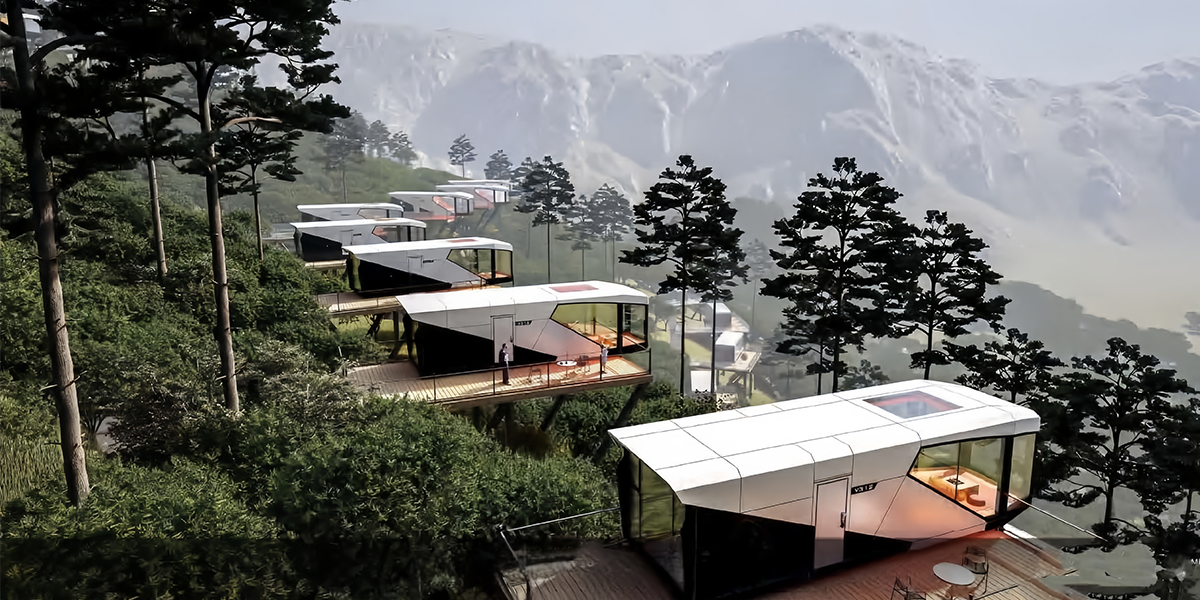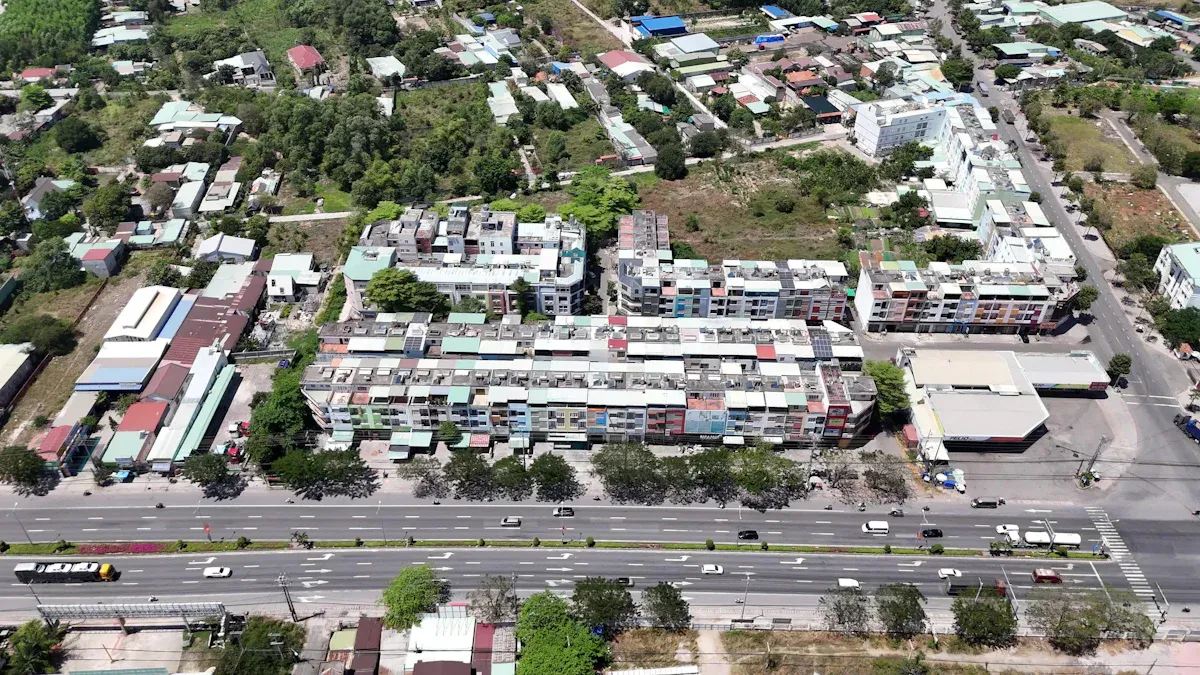
01 Sep How to Get the Right Permits for Your Prefab Capsule House
Table of Contents
You need many permits required before you can build a prefab capsule house. These permits required include planning, building, zoning, environmental, utility, foundation, electrical, and occupancy permits. Many cities also require special use licenses. Cities like Maryland and Washington have strict zoning rules and building permits. If you skip these steps, you might get fines or lose your home.
Always make construction plans and talk to your local building office early. This helps you avoid waiting and makes sure you follow local rules.
Key Takeaways
Begin soon by speaking with your local building and zoning offices. This helps you find out which permits you need. – Collect all needed papers like building plans and site maps before you apply. This helps you avoid waiting longer. – Follow your area’s rules for zoning, building, environment, utilities, foundation, electrical, and occupancy permits. – Get help from experts like builders or permit specialists. They can help you understand hard rules and fill out forms. – Set up inspections when needed and talk clearly with officials. This keeps your project safe and moving forward.
Permits Required

If you want to build a prefab capsule house, you need permits. These permits help you follow the law and keep your house safe. The permits you need can change depending on where you live. They also depend on how you plan to use your capsule house. You should look at local rules and talk to city workers before you start building.
Zoning
Zoning rules tell you where you can put your prefab capsule house. These rules are different in cities and country areas.
Cities have strict zoning laws. You might see confusing rules because capsule houses are new in many places.
Country areas usually have easier rules for capsule houses. You may get more freedom, but you still must follow size and height limits.
City zones may ask for permanent foundations and utility hookups. Country zones sometimes let you use solar panels and composting toilets.
Homeowners’ associations in cities may have extra rules about how your house looks and its size.
If your capsule house does not fit the zone, you can ask for a zoning exception.
Tip: Always talk to your local zoning office to learn what permits you need.
Building
You need building permits to make sure your capsule house is safe. Building codes help protect you and your neighbors.
In New York State, you must follow the 2018 International Building Code and International Residential Code.
You must follow rules for ceiling height, exits, smoke alarms, and plumbing.
Your house needs hot and cold water, heat, and safe stairs or ladders for lofts.
Inspectors must check your house before you can live in it.
Environmental
Environmental permits help protect nature near your house. If you build close to wetlands, trees, or special soil, you need extra permits.
You must follow rules that protect wetlands and other sensitive places.
You may need permits to cut down trees or change the soil.
Local offices can tell you what environmental permits you need for your land.
Note: Rules are tougher near protected wetlands. Always ask your city or county office before you begin.
Utility
You need utility permits for water, power, gas, and sewage. These permits make sure your house works well and is safe.
You must get permits for plumbing, electrical, and sewage hookups.
Prefab capsule houses and regular homes follow the same utility codes.
You must show your plans and get approval before you connect utilities.
Inspectors must check your house before you move in.
Foundation
Foundation permits depend on your land and house type. If your land is flat, you may use gravel, packed soil, or concrete pads. On sloped land, you might need stilts.
You must follow local rules for foundation type and safety.
Some places do not need full foundations, but you must have a strong base.
Tip: Ask local builders and city workers about the permits you need for your foundation.
Electrical
Electrical permits make sure your wiring is safe. Local rules decide what work needs a permit.
Electrical Work | Permit Needed? |
|---|---|
Yes | |
Add new circuits | Yes |
Extend existing circuits | Yes |
Replace lighting fixtures (no change) | No |
Replace circuit breakers/fuses | No |
Replace switches, outlets, bulbs | No |
You must show detailed plans for big electrical jobs. Local workers look at your plans and check your house before you get approval.
Occupancy
Occupancy permits let you live in your capsule house. These permits show your house is safe and follows all rules.
You need occupancy permits before you move in.
If you want to rent your capsule house for short stays, you may need extra permits.
Rules for short-term rentals change by city and state. Always ask your local office.
Special Use Licenses
Some projects need special use licenses. You may need these if you use your capsule house as a hotel, rental, or ship it across state lines.
You must check state rules for delivery and heavy equipment.
Shipping your capsule house may need customs papers, insurance, and import permits.
If you use your house for business, you may need extra licenses.
Callout: Permits can change depending on where you live and how you use your capsule house. Always talk to local workers and follow the newest building codes.
Applying for Permits
 Where to Apply
Where to Apply
You need to go to your local building office to start. Most cities and counties have a building or planning department. In Florida, you apply at the city or county building office. In Washington State, you might also need to talk to the Department of Labor & Industries for some checks. Always ask your local zoning and planning offices because rules are different in each place.
Tip: Some places let you apply online, but others want you to come in. Call first to see what your city or county wants.
Documents Needed
You must collect some papers before you apply. These help the city or county see if your prefab capsule house follows all the rules.
Construction plans with floor plans, elevations, and details about the structure
Site plans that show where your house will be, including space from property lines
Proof that you have water, sewer, or septic system approval
Road permits and drainage plans, if you need them
Letters from landowners if you do not own the land by yourself
Filled-out permit application forms
Special forms for tiny homes or prefab houses, if your area uses them
In Washington State, you must turn in three copies of your building plans. You might also need to pay for inspections and show your house meets state building codes.
Timelines
Getting permits for your prefab capsule house can take different amounts of time. Some cities finish permits in a few weeks. Others may take a few months.
Turn in your application and all your papers.
Wait while the city or county checks your plans.
Make changes if they ask for more information.
Set up inspections during and after building.
Get your certificate of occupancy when you pass all checks.
Note: If you forget a paper or skip a step, your permit might take longer. Always check your papers before you turn them in.
Challenges
Local Regulations
Local rules can make building your prefab capsule house tricky. Every city and county has its own codes. You must follow these codes to get your permits. Some places have rules about house size, height, and where you can put your home. You may see limits on how close your house can be to the street or your neighbor’s land.
Some cities require special permits for prefab or tiny homes.
Rural areas may have fewer rules, but you still need to check.
You might need to follow extra rules if your land is near water or protected areas.
Tip: Visit your local building office. Ask questions about rules for prefab capsule houses. This helps you avoid mistakes and delays.
HOA Rules
Homeowners’ associations (HOAs) can set their own rules for homes in their neighborhoods. You must check these rules before you build. HOAs often control the look and size of homes. They may not allow prefab capsule houses or tiny homes.
HOA Rule Type | What You Should Check |
|---|---|
Appearance | Paint color, siding, roof style |
Size | Minimum square footage |
Placement | Where you can put your house |
Use | Rentals or business use |
You should read your HOA’s guidelines. Talk to the HOA board if you have questions. You may need to ask for special approval.
Note: Breaking HOA rules can lead to fines or legal trouble. Always get written permission before you start building.
Inspections
Inspections help keep your prefab capsule house safe. Inspectors check your work at different stages. You must pass these checks to get your permits.
Inspectors look at your foundation, framing, plumbing, and electrical work.
You may need several inspections before you finish your house.
If you fail an inspection, you must fix the problem and ask for another check.
Callout: Schedule inspections early. Stay in touch with inspectors. This helps you finish your house faster and avoid extra costs.
Permitting Tips
Work with Experts
You can make the permitting process easier by working with experts. Architects, engineers, and permit specialists know local rules. They can help you avoid mistakes that slow down your project. When you hire a professional, you get advice on building codes and zoning laws. You also get help with drawings and paperwork. Many experts have worked with prefab capsule houses before. They know what city and county offices want to see.
Tip: Ask your builder if they have experience with permits for prefab capsule houses. This can save you time and money.
Prepare Documents
You need to gather all your documents before you apply for permits. Missing papers can delay your project. Start by making a checklist of what your city or county needs. Most places ask for site plans, floor plans, and proof of utility connections. Some offices want extra forms for prefab homes. You should label your documents clearly and keep copies for yourself.
Site plan
Floor plan
Foundation details
Utility approval
Application forms
If you organize your papers, you can answer questions faster. This helps the review process go smoothly.
Communicate Clearly
Clear communication helps you get permits faster. When you talk to city or county staff, ask direct questions. Write down names and phone numbers of people you speak with. If you do not understand something, ask for an explanation. You should reply to emails and phone calls quickly. This shows you care about following the rules.
Note: Good communication can help you fix problems before they become big issues.
You can make the process easier if you stay organized and talk to the right people. You will feel more confident as you move forward with your prefab capsule house.
Getting the right permits for your prefab capsule house keeps your project safe and legal. You should start early and gather your plans before you visit your local office. Talk to experts who know the rules in your area. When you follow each step, you avoid delays and problems.
Careful planning helps you move into your new home with confidence.
FAQ
Do you need permits for a prefab capsule house on private land?
Yes, you need permits even on private land. Local rules require you to get zoning, building, and utility permits.
Always check with your city or county office before you start building.
How long does it take to get permits?
Permit approval times vary. Some cities finish in two weeks. Others may take up to three months.
Prepare your documents early
Respond quickly to requests
Schedule inspections as soon as possible
Can you live in a prefab capsule house year-round?
You can live in your prefab capsule house all year if you meet local building codes.
Requirement | Needed? |
|---|---|
Heating | Yes |
Insulation | Yes |
Water/Sewer | Yes |
What happens if you skip getting permits?
If you skip permits, you risk fines or forced removal of your house. Inspectors may stop your project.
Tip: Always follow the rules to protect your investment and avoid legal trouble.




 Where to Apply
Where to Apply